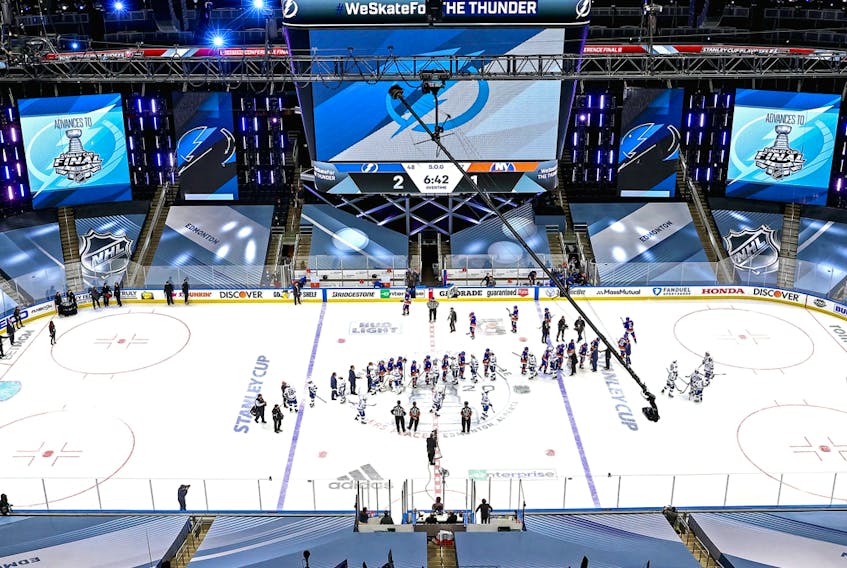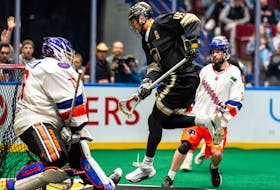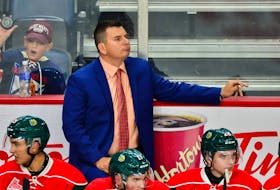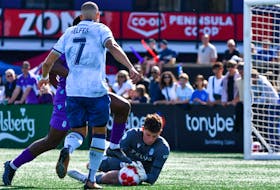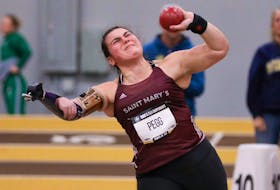It was said by Paul Maurice, head coach of the Winnipeg Jets, before it all began in the Hub City in Edmonton.
“Thirty years from now — guaranteed — no one ever forgets who won the 2020 Stanley Cup.”
O.K., Wednesday’s Game 3 of the final may have been forgettable. But the statistical evidence that has built up as we now near the night where NHL commissioner Gary Bettman presents the Stanley Cup, is overwhelming.
Throughout the playoffs, it has been a special experience for the father-son tabulating twosome of David and Ryan Moir, who had the opportunity to work the once-in-a lifetime event that will unquestionably live on in hockey history. David was part of the broadcast team with Chris Cuthbert and Louie DeBrusk of Sportsnet and Hockey Night In Canada . Ryan worked with Kenny Albert, John Forslund and Mike Emrick with NBC.
Through Wednesday’s 5-2 Tampa Bay win, their analytical eyes and minds had taken in more than almost anybody as we headed to the back-to-back Friday-Saturday Game 4-5 combination at Rogers Place.
“For me, I think the most impressive statistic is the no quit that’s been involved” said David, who became a TV broadcast booth stats man back in the late ’80s, primarily working NHL and Canadian Football League games, in addition to eight Olympics, including five Winter Olympics, four of which involved NHL players and one (Sochi) with his son.
“There had been four games where a team trailed by three goals and came back to tie the game and three of the four won the game.”
To them, it was almost shocking Dallas didn’t come back in Game 3.
“There have been 22 two-goal leads that teams have blown in these playoffs. A few years ago, that was difficult to overcome. Now it seems like it’s almost routine. The fact that the Stars and the Lightning had combined for 21 one-goal victories in their 30 combined wins is proof that almost every game has gone down to the wire.
“Even when they allow the first goal of the game, neither team seems to be overly concerned. The Stars have six wins and the Lightning five wins after their opponent scores first,” added David who figures he’s worked 3,000-plus regular season games, 500-plus in the playoffs and 20-plus Stanley Cup Finals in his career, including 69 in this unique 24-team coronavirus pandemic tournament.
“One thing Ryan and I have talked about involving the comebacks is how we thought some teams would fold early and not have much pushback when down early in a series just because of this unique bubble component. But that hasn’t been the case. We saw three teams in the second round battle back from being down three games to one to force a Game 7. Two of those we had on the same day here in Edmonton. That will probably never happen again.”
Ryan, in his eighth season, said the statistics that have impressed him most have been created by the goalies.
“The number of different goalie storylines these playoffs have given us has been remarkable, It has felt like the goalies stole the show here in the Edmonton bubble. Every day there seemed to be something different.
“There was Darcy Kuemper’s play versus Nashville, standing on his head to record a 3-1 record with a .933 save percentage. There was the Robin Lehner/Marc-Andre Fleury Vegas Golden Knights drama in goal, complete with agent Allan Walsh and his sword-in-the-back picture of Fleury on Twitter.
“Lehner had three shutouts in six games versus Vancouver in the second round and he wasn’t the best goalie in that series. Thatcher Demko stole the show with a 0.67 goals-against average and .984 save percentage, including a shutout in three starts versus Vegas.
“There was Colorado losing Philipp Grubauer and Pavel Francouz early in the second round against Dallas. Michael Hutchinson won his first two starts after having only had one regulation win with the Avs.
“Now for the first time in the history of the Stanley Cup Final, we have two Russian goalies. Anton Khudobin had been on another level. Since the start of the West Final he was 5-2, 1.79 and .947 going into Game 3 Wednesday.”
Some of what’s involved, they both admit, you just can’t attach numbers to.
“The deeper we’ve managed to get, the more obvious it’s become these teams have been dealing with significant injuries to key role players. You really can argue that this will be the hardest Stanley Cup to win in history,” said Ryan.
Added David: “Another statistic to marvel at, I believe, is that the Lightning and Stars are averaging 89.4 hits per game combined in the 2020 playoffs, including 113 in Game 3 Wednesday.
“In comparison, the two teams involved in the final in the previous three playoffs had a combined average of 60.8 in 2017, 70.9 in 2018 and 62.4 in 2019.
“That’s a big toll on the body over the course of the playoffs. That’s another reason why this may be the toughest playoffs to win ever.”
Their eyes and their stats tell the story.
E-mail: [email protected]
On Twitter: @byterryjones
Copyright Postmedia Network Inc., 2020

